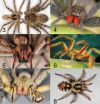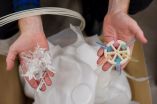New study provides key to identifying spiders in international cargo
2014-10-01
(Press-News.org) Spiders found in international cargo brought into North America are sometimes submitted to arachnologists for identification. Often, these spiders are presumed to be of medical importance because of their size or similarity to spiders that are known to be venomous.
In 2006, after witnessing multiple episodes where harmless spiders were mistaken for toxic ones, Dr. Richard Vetter, an arachnologist at the University of California, asked other arachnologists to provide data on specimens they found in international cargo that had been submitted to them for identification. He also asked that they identify spiders in their museum collections that had previously been found in cargo.
Together with colleagues from Canada and Washington State, Dr. Vetter identified 135 spiders taken from international cargo between 1926 to June 2014, which they describe in an ad hoc study in the Journal of Medical Entomology. The authors hope that their paper will fill a knowledge gap and facilitate the proper identification of cargo-borne spiders because misidentifications can lead to costly and unwarranted eradication measures, unnecessary employee health education, heightened employee anxiety, and spoilage when perishable goods are left unloaded due to safety concerns.
In order to help avoid misidentifications in the future, the new paper contains a simple key that covers the most common non-mygalomorph spiders found in their study.
"This key should provide some utility for those confronted with a spider found in international shipments," they wrote.
The authors found that the most frequently submitted spiders were the pantropical huntsman spider (Heteropoda venatoria) and the redfaced banana spider (Cupiennius chiapanensis), and that the most common cargo from which spiders were submitted was bananas, with most specimens coming from Central America, Ecuador, or Colombia.
Spiders of medical importance were rare.
"Spiders found in international cargo, especially those in banana cartons, are typically harmless species," they wrote. "It would be beneficial if this article curtails the hyperbole and media attention whenever a large spider is discovered in a banana shipment, and thereby, reduce unwarranted paranoia and anxiety when media stories about toxic banana spiders are unleashed onto an unsuspecting and easily frightened North American general public."
INFORMATION:
[Attachments] See images for this press release:

ELSE PRESS RELEASES FROM THIS DATE:
2014-10-01
New insights into botulinum neurotoxins and their interactions with cells are moving scientists ever closer to safer forms of Botox and a better understanding of the dangerous disease known as botulism. By comparing all known structures of botulinum neurotoxins, researchers writing in the Cell Press journal Trends in Biochemical Sciences on October 1st suggest new ways to improve the safety and efficacy of Botox injections.
"If we know from high-resolution structures how botulinum neurotoxins interact with their receptors, we can design inhibitors or specific antibodies ...
2014-10-01
WASHINGTON— The Society for Public Health Education (SOPHE) proudly announces the publication of a Health Education & Behavior (HE&B) supplement devoted to the latest research and practice to promote healthy aging. The October 2014 supplement, "Fostering Engagement and Independence: Opportunities and Challenges for an Aging Society," contains a dozen peer-reviewed articles on innovative behavioral and psycho-social approaches to improve the health of the nation's fastest growing cohort - older adults.
Together the articles describe promising advances in research directed ...
2014-10-01
BEIJING; BERKELEY, CA; and UPTON, NY - The Daya Bay Collaboration, an international group of scientists studying the subtle transformations of subatomic particles called neutrinos, is publishing its first results on the search for a so-called sterile neutrino, a possible new type of neutrino beyond the three known neutrino "flavors," or types. The existence of this elusive particle, if proven, would have a profound impact on our understanding of the universe, and could impact the design of future neutrino experiments. The new results, appearing in the journal Physical Review ...
2014-10-01
CUMBERLAND, MD (October 1, 2014)--When scientists talk about the consequences of climate change, it can mean more than how we human beings will be impacted by higher temperatures, rising seas and serious storms. Plants and trees are also feeling the change, but they can't move out of the way. Researchers at the University of Maryland Center for Environmental Science and University of Vermont have developed a new tool to overcome a major challenge of predicting how organisms may respond to climate change.
"When climate changes, organisms have three choices: migrate, adapt, ...
2014-10-01
BUFFALO, N.Y. — If a person is dually diagnosed with a severe mental illness and a substance abuse problem, are improvements in their mental health or in their substance abuse most likely to reduce the risk of future violence?
Although some may believe that improving symptoms of mental illness is more likely to lessen the risk for future episodes of violence, a new study from the University at Buffalo Research Institute on Addictions (RIA) suggests that reducing substance abuse has a greater influence in reducing violent acts by patients with severe mental illness. ...
2014-10-01
New Rochelle, NY, October 1, 2014—Regulation of the human immune system's response to infection involves an elaborate network of complex signaling pathways that turn on and off multiple genes. The emerging importance of long noncoding RNAs and their ability to promote, fine-tune, and restrain the body's inflammatory response by regulating gene expression is described in a Review article in Journal of Interferon & Cytokine Research (JICR), a peer-reviewed publication from Mary Ann Liebert, Inc., publishers. The article is available free on the JICR website.
In the Review ...
2014-10-01
COLUMBIA, Mo. – Relational aggression, or "mean girl" bullying, is a popular subject in news and entertainment media. This nonphysical form of aggression generally used among adolescent girls includes gossiping, rumor spreading, exclusion and rejection. As media coverage has illustrated, relational aggression can lead to tragic and sometimes fatal outcomes. Despite these alarming concerns, little has been done to prevent and eliminate these negative behaviors. Now, University of Missouri researchers have developed and tested an intervention that effectively decreases relational ...
2014-10-01
This news release is available in French and Spanish. The Commission for Environmental Cooperation (CEC) has released a comprehensive report on the changing face of industrial pollution in North America, covering the years 2005 through 2010. This is the first time an edition of the CEC's Taking Stock series, which gathers data from pollutant release and transfer registers (PRTRs) in Canada, Mexico and the United States, has analyzed North American pollutant information over an extended timeframe. To view the report, visit http://www.cec.org/library.
This volume ...
2014-10-01
Biological sensors, or biosensors, are like technological canaries in the coalmine. By converting a biological response into an optical or electrical signal, they can alert us to dangers in our external and internal environments. They can sense toxic chemicals and particles in the air and enzymes, molecules, and antibodies in the body that could indicate diabetes, cancer, and other diseases.
An optical biosensor works by absorbing a specific bandwidth of light and shifting the spectrum when it senses minor changes in the environment. The narrower the band of absorbed ...
2014-10-01
It's old news that open-source 3D printing has a lot going for it: it's cheap, green and incredibly useful for making everything from lab equipment to chess pieces. Now it's time to add another star to the 3D printing constellation. It may help lift some of the world's most destitute people from poverty while cleaning up a major blight on the earth and its oceans: plastic trash.
At the center of the movement is a new set of standards inspired by fair trade products ranging from diamonds to chocolate.
"We are creating a new class of material called ethical 3D printing ...
LAST 30 PRESS RELEASES:
[Press-News.org] New study provides key to identifying spiders in international cargo




